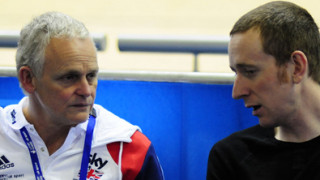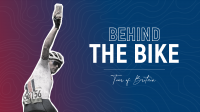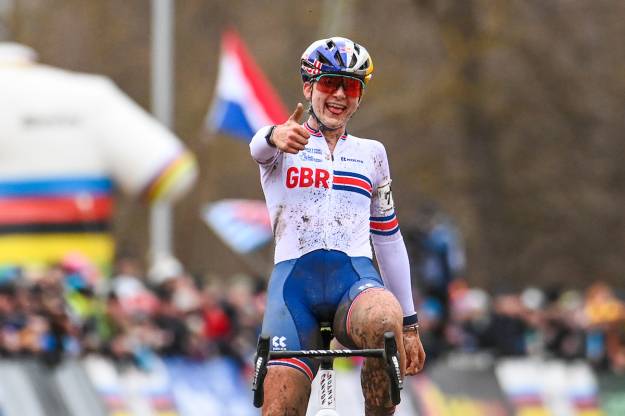‘It’s an emotional skill - it’s no different to a bike skill’. Dr Steve Peters’ synopsis doesn’t scratch the surface of the mind techniques which have seen the Great Britain psychiatrist hailed by the likes of Sir Chris Hoy, Bradley Wiggins and Victoria Pendleton.
Peters chats with Great Britain endurance rider Bradley Wiggins
Peters - whose earlier career included time working at Rampton High Security Hospital dealing with patients suffering from serious personality disorders - has been an integral part of Great Britain Cycling Team’s accomplishments since his initial work with the team in 2001, helping each rider better understand and use the brain (machine) they possess and ensuring that they are in control of what he labels the ‘chimp’ – an emotional machine that can act for us and influence us.
“Every person has a machine in their head, which has thoughts and emotions. What we want to know is what are these thoughts and emotions doing and how does this impact on their sporting performance?” explains Peters, whose role as a psychiatrist falls under his mantra as head of medicine for the GB Cycling Team. “The first thing I ask from my perspective as a psychiatrist is ‘do you understand what the machine is in your head, do you understand how it works and when you understand it, can you operate it?’
|
"What we want to know is what are these thoughts and emotions doing and how does this impact on their sporting performance?" Dr Steve Peters |
||
“Part of the brain can be thought of as operating similar to a chimp – it may give us thoughts and feelings we really don’t welcome, that may sabotage our success but can be useful at other times. Another part of the brain can be thought of as operating as a human. There are actual parallel systems in the physical brain which mirror these two, they are like little teams in the head, a Human team and a Chimp team.”
Peters, who has won several world masters sprint titles (applies his psychological techniques to himself), is candid when describing his own ability on the velodrome track as ‘appalling’ – he then uses this example to illustrate how individual any psychological coaching must be.
“It’s no different to a bike skill. If you took me onto the track my ability on the bike in the velodrome is appalling so I’m in trouble. But you as a coach can get me up to a better standard. You’ll never get me to the Olympics, but you could certainly get me to a standard that is fair - my ceiling.
“It’s the same for me as an emotional skills coach. I sometimes meet people who have very little ability to manage their emotions and thoughts. My job is to try and lift that up to a position where they can say ‘I’m not an Olympic emotionally skilled person but I’m certainly able to get better and actually stop any destructive or unhelpful thoughts from interfering in what I’m trying to do’. Basically what I am doing is getting them to lift their ability to manage the machine - everyone’s different.”

Peters' methods have attracted the praise of Sir Chris Hoy
Individualism is fundamental to Peters’ philosophy. There is no ‘one size fits all’ solution, but instead a plan tailored to each person’s needs. Even with an impressive track record which transcends cycling – the nicknamed ‘brain mechanic’ has worked with the England rugby team in 2007, Liverpool footballer Craig Bellamy and snooker star Ronnie O’Sullivan - Peters acknowledges that he can’t ‘brainwash’ and the onus lies with each person if they are to manage their chimp.
“Some people start from a good psychological basis and don’t need too much input - they’re running at an 85% emotion skills level and that’s pretty good, whereas I do meet people who are as low as 10% and say ‘I haven’t got a clue how to deal with thoughts and emotions’. But that doesn’t mean they can’t get to 100%. Research indicates that if you keep trying with commitment, you can actually keep on improving throughout life and reach very high standards of emotional skills. So it’s quite encouraging to know that as long as you keep going and you make the effort you can continue to improve.
“But ultimately it relies on the person themselves to apply the skill - all I can do is to give techniques to help them if they can’t manage. I can give techniques that will help manage their machine emotionally while they’re learning but there’s a limit to what I can do as it relies on the person to do the work.”
Mental resolve in elite sport is often cited as the difference between victory and defeat - keeping focus at the pinnacle of an event, the determination to convert potential into successful outcomes. Such a task will reach its summit for Great Britain’s stars in a home Olympic Games this year. But quantifying mental resolve for an athlete is a near impossibility according to Peters, who again stresses the importance on the person’s ability and commitment.
“I think we have to be careful, in that everyone is individual and so you can’t give a generic answer and say that developing emotional skills is critically important for all riders,” Peters argues. “For example, two riders in the same race may have different emotions. One may be relaxed and managing their emotions well, therefore for them the impact of emotion during the race will be low. Whereas, the second rider may be a very anxious individual, who panics easily and loses confidence, and for this rider the impact of their emotions on their performance is very high.
“So when we look at the impact of emotion on performance everybody is unique. I don’t think you can say ‘if you develop your mental skills you will definitely get, for example, a 50% improvement in performance as it all depends on the person’. My approach is always to ask the person ‘how much do you think your emotions impact on your performance and do you want to do anything about this?’ My experience across various sports is that possibly as many as 90% of elite sports people will say that mental attitude and ability to deal with emotions and thoughts are critical to a successful performance.
“Potentially therefore you could increase your performance by developing emotional skills and it’s so much easier to perform when your emotions are on board and actually working for you.”









